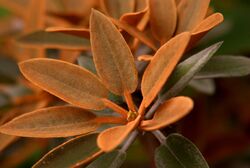Biology:Rhododendron pachysanthum
| Rhododendron pachysanthum | |
|---|---|

| |
| Scientific classification Error creating thumbnail: Unable to save thumbnail to destination
| |
| Kingdom: | Plantae |
| Clade: | Tracheophytes |
| Clade: | Angiosperms |
| Clade: | Eudicots |
| Clade: | Asterids |
| Order: | Ericales |
| Family: | Ericaceae |
| Genus: | Rhododendron |
| Species: | R. pachysanthum
|
| Binomial name | |
| Rhododendron pachysanthum Hayata
| |
Rhododendron pachysanthum (Chinese: 台湾山地杜鹃; pinyin: Táiwān shāndì dùjuān),[1] the thick-flowered rhododendron,[2] is a species of flowering plant in the heath family Ericaceae, that is native to Taiwan. It is an evergreen shrub growing to 2.5 m (8.2 ft) tall and broad. This species is particularly noted for its 9 cm (3.5 in) leaves, which may be heavily felted on both surfaces, red above and brown beneath. In early spring, trusses of pale pink flowers appear, spotted crimson on the inner surface.[2]
In cultivation in the UK Rhododendron pachysanthum has gained the Royal Horticultural Society’s Award of Garden Merit.[2][3] It is hardy down to −15 °C (5 °F) but like most rhododendrons it requires a sheltered spot in dappled shade, and an acid soil enriched with leaf mould.
Synonyms
- Rhododendron pseudochrysanthum Hayata
- Rhododendron f. rufovelutinum T. Yamazaki
- Rhododendron pseudochrysanthum var. rufovelutinum (T. Yamazaki) T. Yamazaki
- Rhododendron rufum Batalin var. pachysanthum (Hayata) S. S. Ying.
References
- ↑ Mingyuan, Fang; Chamberlain, David F., "Rhododendron pachysanthum", Flora of China, 14, http://www.efloras.org/florataxon.aspx?flora_id=2&taxon_id=242344269, retrieved 6 October 2018
- ↑ 2.0 2.1 2.2 "RHS Plantfinder - Rhododendron pachysanthum". https://www.rhs.org.uk/Plants/23688/Rhododendron-pachysanthum/Details. Retrieved 3 October 2018.
- ↑ "AGM Plants - Ornamental". Royal Horticultural Society. July 2017. p. 85. https://www.rhs.org.uk/plants/pdfs/agm-lists/agm-ornamentals.pdf. Retrieved 2 October 2018.
Wikidata ☰ Q10914686 entry
 |

